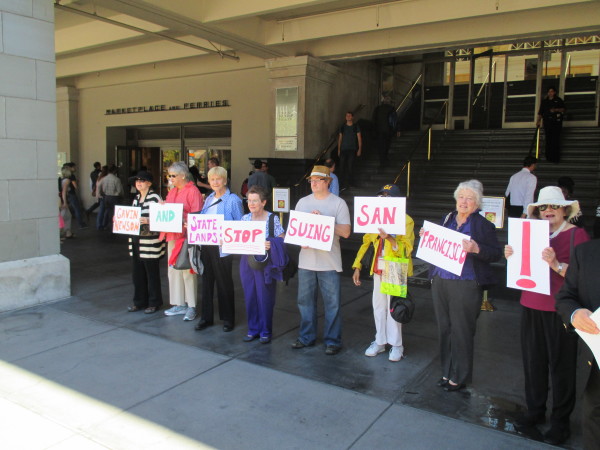
The proposed settlement agreement announced Wednesday in the State Lands Commission’s lawsuit to overturn Proposition B represents a near-total concession by the state.
It also suggests that Lt. Gov. Gavin Newsom may have been wary of allowing his role in a suit against his former city become a campaign issue.

Prop. B requires voter approval for new construction on the San Francisco waterfront that exceeds existing height limits.
The commission, on which Newsom sits, filed the lawsuit shortly after voters passed Prop. B in 2014 with 59 percent of the vote. The lawsuit finally went to trial last month.
Under the proposed settlement, the State Lands Commission would drop its lawsuit challenging the validity of Prop. B. The agency would agree to partner with the Port to advocate for funding the urgently needed Seawall Resiliency Project, and to facilitate affordable housing on trust lands that “have been filled, and reclaimed, and are no longer necessary for public trust purposes.”
(The State Lands Commission press release also says the lands must be “cut off from the water,” but the text of the proposed settlement provided by their press office does not contain that additional language.)
In exchange, the city agreed that future waterfront land use decisions will include written findings stating the approved developments are consistent with the public trust doctrine and benefit the people of California. The city also agreed that when future measures appear on the ballot which affect Port property, the ballot pamphlets will include an informational notice that the measure involve public trust lands which the city holds in trust on behalf of the people of California.
In other words, not much.
Help us save local journalism!
Every tax-deductible donation helps us grow to cover the issues that mean the most to our community. Become a 48 Hills Hero and support the only daily progressive news source in the Bay Area.
“It’s one of the biggest political backfires I’ve ever seen,” said Jon Golinger, who was instrumental in the Prop. B and No Wall on the Waterfront campaigns. He said the commissioners, including Newsom, “took four years of taking hits and got nothing out of it.”
Golinger said the state likely settled because it looked like the judge was going to rule in favor of the city. “The writing was not just on the wall—but also on the floor, and the chairs,” he said.
Louise Renne, former San Francisco City Attorney, agreed. “I think probably they knew they were going to lose,” she said.
Golinger credited Supervisor Aaron Peskin with bringing the parties together.
In a written statement, Peskin called it a resounding win for San Francisco. “The message to the state is clear: stop bulldozing our local authority. San Francisco spoke with one voice in 2014 to protect the public’s most prized asset, our waterfront. The settlement is a vindication of the power of the people.”
Sunny Angulo, a legislative aid for Peskin, said language would be introduced at the next Board of Supervisors meeting on Tuesday amending the election code to comply with the terms of the settlement.
In the State Lands Commission’s press release, Newsom said, “Through this agreement, we’ve accomplished the State Lands Commission’s objective in bringing this litigation: to prevent Prop. B from creating a precedent weakening environmental protections statewide.”
But weakening environmental protections wasn’t an argument put forward at trial by the state for overturning Prop. B.
“I think you’re conflating the words of the deputy attorney general with those of the Lieutenant governor. The lieutenant governor wasn’t at the trial,” said Rhys Williams, a spokesperson for Newsom, in a written statement—raising questions about how closely the State Lands Commission worked with the Attorney General’s Office to formulate the legal strategy.
“The Lt. Governor’s concern regarding Prop. B was that it unintentionally created a statewide precedent that would undermine the state’s ability to protect California’s coast.”
Jennifer Molina, press secretary for the California Department of Justice, said she couldn’t comment on how closely the two agencies worked together on the legal arguments, and that they were referring all inquiries to their client, the State Lands Commission.
Williams also said that Newsom, in his role as one of the three commissioners, did not take part in the State Lands Commission’s decision to file the lawsuit against his hometown. He said that on Aug. 17, 2017, the commission waved its privilege with respect to its 2014 vote in closed session to pursue litigation.
“In waiving that privilege, the Commission disclosed that then-Controller John Chiang’s alternate (and also Chair of the Commission at the time) and the Director of Finance voted in favor of the litigation. Lt. Gov. Newsom was represented by his alternate, who abstained.”
That contradicts what Newsom previously told 48 Hills in 2014, when he said all three commissioners were unanimous in their decision to file the lawsuit.
He has had numerous opportunities over the past year to distance himself from the suit, but he has never done so. In fact, he has repeatedly defended the Lands Commission position.
Antonio Villaraigosa, Newsom’s chief rival for governor, has criticized Newsom for his role in the suit – as has the Sierra Club. At this weekend’s state democratic convention, delegates, who include an increased number of progressives, will have a chance to vote on an endorsement for governor.


Gee,
The Democrats didn’t endorse Gavin.
Or, for God’s sake …
Feinstein!
Alioto for Mayor!
Go Giants!
h.